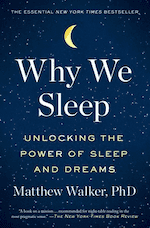
Revelatory Facts in 'Why We Sleep'
A post to learn and reflect about a crutial aspect of life: sleep.
Matthew Walker’s book, “Why We Sleep,” is a real game-changer. All the cool stuff I’m sharing comes straight from him or the authors he quotes. And hey, I might’ve rephrased some things to make it easier to understand.
Turns out, sleep is super crucial for everything we do! If we don’t get enough shut-eye, our thinking gets fuzzy, and our memory goes bust. Plus, it messes with our health big time, making us more prone to all sorts of problems.
Let me me share with you the facts and practices that most caught my attention after reading the book, and, in the last part, I will talk about some insights about my last 4 years of sleep (hint: they are not good).
Most of the sentences in this text were extracted and readapted. All ideas and quotes are found on the pages of the book.
- Part 1: This Thing Called Sleep
- Part 2: Why Should You Sleep?
- Part 3: How and Why We Dream
- Part 4: From Sleeping Pills to Society Transformed
- My Data: What can I learn from 4 years of sleep tracking?
- Farewell
Part 1: This Thing Called Sleep
C1: To Sleep
Routinely sleeping less than six hours demolishes your immune system. This affected lifestyle increases the likelihood you will develop Alzheimer’s disease, blood sugar level disruptions, pre-diabetes, blocked arteries, and multiple other complications.
The WHO even declared a sleep loss epidemic throughout industrialized nations— nevermind coronavirus.
Sleep is no joke. After all, one third of our entire lives will be spent sleeping. That’s about 25 years out of a life expectancy of 75. 25 years! And each second is very much needed! But it is puzzling in its own way. While we sleep, we cannot reproduce, nurture, protect ourselves or others, work, study, laugh, cry, nothing albeit sleep. It’s a time of complete vulnerability.
Still, the benefits are unavoidable to our brains and bodies. Sleeping allows us to navigate next-day social and psychological challenges with cool-header composure. I imagine you can notice the difference in your mood and sharpness whenever you went through hours of no sleep.
This are not shiny, unfounded words. Science is increasingly experimenting and observing the consequences of irregular, bad sleep. By studying sleep wave recordings, researchers can potentially diagnose which type of dementia a sleep deprived person can develop.
C2: Caffeine, jet lag, and melatonin: losing and gaining control of your sleep rhythm
I have always been an owl. That is, I am the owlness chronotype, not the larkness one. Whether you are a night owl like me or a morning lark, it is believed to be strongly linked to genetics (you probably share any with one or both your parents).
Sadly, society (and parents most of the time) treats labels us as lazy, since we won’t wake up early in the day. Morning larks go to the extent of criticizing owls, citing their lack of ‘willingness and discipline’, as if owls deliberately chose such chronotype. This is unfair and wrong: night owls are not such by choice, but by genetics. They are bound to a delayed schedule by unavoidable DNA hardwiring. It is not the owls’ conscious fault, but their genetic fate.
Besides, think about this trait in terms of survival. What if we were all owls or all larks? We would all leave a window of time were we are fully asleep, and thus completely vulnerable to threats and attacks. Mother Nature seems to have triggered a smarted move. By spreading us between the two chronotypes, we increase our survival fitness, with ‘guards’ on call on every hour.
Another interest comment is that on the difference we experience when travel either west or east. When we travel westward, in the direction of our internal clock (our circadian rhythm), that “day” is longer than 24 hours and it feels easier to accommodate to. However, if we travel eastward, the “day” seems shorter, goes against our clock, and thus feels rather harder to adapt to.
Watchout for caffeine consumption. By hijacking and occupying these receptors, caffeine blocks the sleepiness signal normally communicated to the brain by adenosine. The upshot: caffeine tricks you into feeling alert and awake, despite the high levels of adenosine that would otherwise seduce you into sleep.
Caffeine has an average half-life of 5 to 7 hours. Let's say that you have a cup of coffee after your evening dinner, around 7:30 PM. This means that by 1:30 AM, 50% of the caffeine may still be active and circulating throughout your brain tissue. In other words, by 1:30 AM, you're only halfway to completing the job of cleansing your brain of the caffeine you drink after dinner.
Also be aware that de-caffeinated does not mean non-caffeinated. One cup of decaf usually contains 15% to 30% of the dose of a regular cup of coffee, which is far from caffeine free. Should you drink 3 to 4 cups of decaf in the evening, it is just as damaging to your sleep as one regular cup of coffee.
Setting aside the extreme case of sleep deprivation, how do you know that are your routine getting enough sleep? While a sleep assessment is needed to thoroughly address this issue, an easy rule of thumb is to answer two simple questions. First, after waking up in the morning, could you fall back asleep at 10 or 11 AM? If the answer is “yes”, you are likely not getting sufficient sleep quantity and/or quality. Second, can you function optimally without caffeine before noon? If the answer is “no”, then you are most likely self-medicating your state of chronic sleep deprivation.
C3: Defining and generating sleep
The two stages of sleep NREM and REM play out in a recurring push-pull battle of brain domination across the night. The cerebral war between the two is one and lost every 90 minutes, rolled first by NREM sleep, followed by the comeback of REM sleep.
In the first half of the night, the vast majority of our 90 minute cycles are consumed by deep NREM sleep, and very little by REM sleep, as can be seen in cycle one of the figure above. But as we transition through into the second half of the night, this seesaw balance shifts, with most of the time dominated by REM sleep, with little, if any, deep NREM sleep. Cycle 5 is a perfect example of this REM-rich type of sleep.
A key function of deep NREM sleep, which predominates early in the night, is to do the work of weeding out and removing unnecessary neural connections. In contrast, the dreaming stage of REM sleep, which prevails later in the night, plays a role in strengthening those connections.
When you decide to sleep full eight hours of sleep starting from midnight but you decide to wake up at 6 AM instead of 8 AM you will lose 60 to 90% of all your REM sleep, even though you are losing 25% of your total sleep time.
NREM sleep is one of the most epic display of neural coordination that we know of. Many thousands of brain cells have all decided to unite and fire at the same time.
Each night, the long range brain waves of deep sleep will move memory packets (recent experiences) from short-term storage site, which is fragile, to a more permanent, and thus safer, long-term storage location.
When it comes to information processing, think of the wake state principally as reception, NREM sleep as reflection, and REM sleep as integration.
By eliminating muscle activity during REM sleep you are prevented from acting out your dream experience. Wise, then, of Mother Nature to have tailored a physiological straight jacket that forbids fictional movements from becoming a reality, specially considering that you have stopped consciously perceiving your surroundings.
C4: Ape beds, dinosaurs, and napping with half a brain: who sleeps, how do we sleep, and how much?
Theodosius Dobzhansky: Nothing in biology makes sense except in light of evolution
Considering how biologically beneficial the state of sleep is, we can pose a very different theory: sleep was the first stage of life on this planet, and it was from sleep that wakefulness emerged. It may be a preposterous hypothesis, and one that nobody is taking seriously or exploring, but I personally do not think it to be entirely unreasonable.
As millennia unfolded and evolution crowned its current accomplishment with the genesis of the brain, the demand for sleep only increased, tending to the needs of this most precious of all physiological apparatus. It can be suggested that one evolutionary function that demands more also is the need to service an increasingly complex nervous system.
To dream or not to dream
Insects, fish and most reptiles show no queer signs of REM sleep. Only birds and mammals have full-blown REM sleep. It suggests that dream (REM sleep) is the new kid on the evolutionary block. REM sleep seems to have emerged to support functions that are NREM sleep alone could not accomplish, or that REM sleep was more efficient at accomplishing.
It is important to note that regardless of the amount of recovery opportunity, the brain never comes close to getting back all the sleep it has lost. This is true for total sleep time, just as it is for NREM sleep and for REM sleep. That humans can never “sleep back” that which we have previously lost is one of the most important take-homes of this book, the saddening consequences of which I will describe in chapter 7 and 8.
Cetaceans, such as dolphins and whales, have sleep which is only NREM, which can be unihemispheric, meaning they will sleep with half of the brain at a time! One half always stays awake to maintain life necessary movement, but the other half of the brain will fall into NREM sleep.
Even more, in-flight migrating birds will grab remarkably brief periods of sleep lasting only seconds in duration. This ultra power naps are just sufficient to avert the ruinous brain and body deficits that what otherwise ensure from prolonged total sleep deprivation.
How should we sleep
Hunter-gatherer tribes, whose way of life has changed little over the past thousands of years, sleep in a biphasic pattern. These groups take a similarly longer to sleep period at night, greater than the average of Western cultures, filled by a 30 to 60 minute nap in the afternoon.
Not enjoying a full afternoon nap, further contributes to our state of sleep bankruptcy.
The practice of biphasic sleep is not cultural in origin, it is deeply biological. All humans have a genetically hardwire dip in alertness that occurs in the midafternoon hours. We all experience a brief dissent from high degree wakefulness to low level alertness after the midday meal. Should you ever have to give a presentation at work, for your own sake – and then of the conscious state of your listeners – if you can, avoid the afternoon slot!
There is genetic evidence that the true painter of biphasic sleep consists of continuous sleep at night, followed by a shorter midafternoon nap.
A study made in more than 23,000 Greek adults consisted of tracking the group across a six-year period as the siesta practice came to an end for many of them.
Does that abandoned regular siestas went on to suffer at 37% increase risk of death from heart disease across the six year period, relative to those who maintained regular daytime naps. The effect was specially strong in workingmen, were the ensuing mortality risk of not napping increased by well over 60%.
It is perhaps surprising that in the small enclaves of Greece were siestas still remain intact, men are nearly 4 times as likely to reach the age of 90 as American males.
NREM sleep helps transfer and make safe newly learned information into long-term storage sites of the brain. But it is REM sleep that takes these freshly minted memories and begins colliding them with the entire back catalogue of your life’s autobiography.
REM sleep dreaming therefore represents tenable new contributing factor, among others, that led to our astonishingly rapid evolutionary rise to power, for better and worse, a new sleep-fueled, globally dominant social superclass!
C5: Changes in sleep across the life span
Sleep after birth
Depriving infants rats of REM sleep stalled construction of their neural rooftop-the cerebral cortex of the brain. Day after day, the half-finished roofline of the sleep-starved cerebral cortex shows no growth change.
Infants and young children who show signs of autism, or who are diagnosed with autism, do not have normal sleep patterns or amounts. The circadian rhythms of autistic children are also weaker than their non-autistic counterparts, showing a flatter profile of melatonin across the 24 hour period rather than a powerful rise in concentration at night and rapid fall throughout the day.
Autistic individuals show a 30% to 50% deficit in the amount of REM sleep they obtain, relative to children without autism. Irrespective of casuality issues, tracking sleep abnormalities represents a new diagnostic hope for the early detection of autism.
The newborns of heavy drinking mothers spent far less time in the active state of REM sleep compared with infants of similar age but who were born of mothers who did not drink during pregnancy. Besides, infants of heavy drinking mothers showed a 200% reduction of vibrant electrical activity relative to the infants born of non-alcohol-consuming mothers. When babies consume alcohol laced milk, their sleep is more fragmented, they spend more time awake, and they suffer a 20 to 30% suppression of REM sleep soon after.
Sleep and adolescence
Even though the degree of neural networks connectivity decreases during development, the physical size of our brain cells, and thus the physical size of the brain and head, increases. Adolescents have a less rational version of an adult brain, one that takes more risks and has relatively poor decision making skills.
Deep sleep may be a driving force of brain maturation, not the other way around. Rationality is one of the last things to flourish in teenagers, as it is the last brain territory to receive sleep’s maturational treatment.
The circadian rhythm of a teenager will not be miraculously coaced into a change. Asking that same teenager to wake up at seven the next morning and function with intellect, grace, and good mood is the equivalent of asking you, their parent, to do the same at 4 or 5 AM.
Passing into your mid- and late 40s, age will have stripped you of 60% to 70% of the deep sleep you were enjoying as a young teenager. By the time you reach 70 years old, you will have lost 80 to 90% of your youthful deep sleep.
Many seniors progress through their later years not fully realizing how degraded their deep sleep quantity and quality have become. This is an important point: it means that elderly individuals fail to connect their deterioration in health with their deterioration in sleep, despite casual links between the two having been known to scientists for many decades.
Any individual, no matter what age, will exhibit physical ailments, mental health instability, reduced alertness, and impaired memory if their sleep is chronically disrupted.
The third sleep change with advanced age is that of circadian timing. In sharp contrast to adolescents, seniors commonly experience a regression in sleep timing, leading to earlier and earlier bedtimes. The cause is an earlier evening release and peak of melatonin as we get older, instructing an earlier start time for sleep. Restaurants in retirement communities have long known of this age related shift in bed time preference, epitomized and accommodated by the “early bird special”. Their regressed circadian rhythm, instructed by an earlier release of melatonin, left them no choice.
Plentiful later-afternoon daylight will help the delay the evening release of melatonin, helping push the timing of sleep to a later hour. Make sure to wear sun protection of some sort, such as a hat, but leave the sunglasses at home.
Part 2: Why Should You Sleep?
C6: Your Mother and Shakespeare Knew
Observations of the brain show a strikingly reliable loop of electrical current pulsing throughout the brain that repeats every 100 to 200 ms.
This electrical transaction in the quiet secrecy of sleep is one that shifts fact-based memories from the temporary storage depot, the hippocampus, to a long-term secure vault, the cortex. This shift is the product of slow brainwaves of deep NREM sleep that serve as a courier service. In doing so, sleep helps future-proof those memories.
Studies shows a memory retention benefit of between 20% and 40% being offered by sleep, compared to the same amount of time awake.
Not only does NREM sleep maintain those memories you have successfully learned before bed, but it will even salvage those that appear to have been lost soon after learning.
Another study shows that relative to a control group that slept but had no synchronous auditory chimes at night, the auditory stimulation increased the power of the slow brainwaves and returned an impressive 40% memory enhancement the next morning
Sleep to forget?
The capacity to forget can, in certain contexts, be as important as the need for remembering. In this way, sleep helps you retain everything you need and nothing that you don’t.
This occurs when taking a nap while studying for an exam, for instance. The more of those NREM sleep spindles a person has during a nap, the greater the efficiency with which they strengthen concepts tagged for remembering and actively eliminate those designated for forgetting.
Practice alone does not make perfect
Muscle memory is, in fact, brain memory. The routine itself, the memory program, resides firmly and exclusively within the brain.
A pianist friend of the author told him that he would be practicing a particular piece for hours and wouldn’t be able to master it. Often, he would make the same mistake at the same place in a particular movement. He would then go to bed frustrated, but the next morning, after sitting back down at the piano, he would just play it perfectly.
Does this mean that the most repeated and entrusted teaching edict, “practice makes perfect“ is violated? Perhaps it was practice, with sleep, that makes perfect?
Perhaps more relevant to the modern world is the time-of-night that was discovered. Those last two hours of sleep are precisely the window that many of us feel it is OK to cut short to get a jump start on the day. As a result, we miss out on this feast of late morning sleep spindles that are deeply linked with the offline memory boost. Loose out on the last hours of sleep for an 8 hour night, and your memory capacity can be seriously affected.
Sleep and Sport
Some teams are aware of sleep’s importance before a game. But sleep after a game can be as essential. Post-performance sleep accelerates physical recovery from common inflammation, stimulates muscle repair, and helps restock cellular energy in the form of glucose and glycogen.
Sleep for Creativity
Sleep provides a nighttime theater in which your brain tests out and builds connections between vast stores of information. This task is accomplished using a bizarre algorithm that is biased towards seeking out the most distant, non-obvious associations, rather like a backward Google search.
C7: Too extreme for the Guinness book of world records
Sleep deprivation and the brain
Most worrying from a societal perspective were the individuals in the group who obtained six hours of sleep a night—something that may sound familiar to many of you. Ten days of six hours of sleep a night was all it took to become as impaired in performance as going without sleep for 24 hours straight.
You do not know how sleep-deprived you are when you are sleep-deprived
With chronic sleep restriction over months or years, an individual will actually acclimate to their impaired performance, lower alertness, and reduced energy levels.
60 years of scientific research prevents the author from accepting anyone who tells him that he or she can “get by on just four or five hours of sleep a night just fine“.
And I can also say this. I had teachers at school who showed off how little they slept. This different influenced me in believing that sleep was an obstacle to one’s progress. Even into my university years, I always compromised sleep over extra study time, with questionable results.
Even though one might believe that sleep hours can be recovered during the weekend, studies show that the brain is in capable of that. It is simply not enough to repair the damage done by a work week of sleep deprivation.
Operating on less than five hours of sleep and your risk of a car crash increases threefold. Get behind the wheel of a car when having slept just four hours or less the night before and you are 11.5 times more likely to be involved in a car accident.
The recycle rate of a human being is around 16 hours. After 16 hours of being awake, the brains begins to fail. Humans need more than seven hours of sleep each night to maintain competitive performance. After 10 days of just seven hours of sleep, the brain is as dysfunctional as it would be after going without sleep for 24 hours. Three full nights of recovery sleep are insufficient to restore performance back to normal levels after a week of short sleeping. Besides, the human mind cannot actually sense how sleep deprived it is when sleep deprived.
Drowsy driving alone is worse than driving drunk. Drunk drivers are often late in breaking, and late in making evasive maneuvers. But when you fall asleep, or have a microsleep, you stop reacting altogether!
With a full night of plentiful sleep we have a balanced mix between our emotional gas pedal (amygdala) and break (prefrontal cortex). Without sleep, however, the strong coupling between these two brain regions is lost. We cannot rein in our impulses -too much emotional gas pedal and not enough regulatory break. Without the rational control giving to us each night by sleep, we are not on a neurological and emotional balance.
There is no psychiatric condition in which sleep is normal. This is true of depression, anxiety, PTSD, schizophrenia, and bipolar disorder. Studies show that improving sleep quantity, quality, and regularity heals the mind of numerous psychiatric populations.
A lack of sleep is a deeply penetrating and corrosive force that enfeebles the memory making apparatus within your brain, preventing you from constructing lasting memory traces. It is rather like building a sand castle too close to the tide line—the consequences are inevitable.
It is clear now that pulling all nighter‘s is not a wise idea for learning, not because you won’t learn during those hours, but because you won’t recall later on what you learned previously!
This, of course, is really not under the consideration of faculties around the globe. Teachers accumulate exams in the final days of a semester, leaving no other choice to students than to compromise sleep hours in favor of learning.
Many can answer to that argument saying that the students “make their own choices” or that students “are responsible if they do not sleep properly”. But science shows something different. If you don’t sleep the very first night after learning, you lose the chance to consolidate those memories, even if you get lots of “catch up“ sleep thereafter. Sleep is not like the bank. You cannot accumulate a debt and hope to pay it off at a later point in time. Sleep for memory consolidation is an all or nothing event. It is a concerning result in our 24 seven, hurry up, don’t wait society.
Sleep and Alzheimer’s disease
As we get older, it is common for us to have a general loss of deep sleep. But for Alzheimer’s patients, there is a ruthless eroding of the very deepest of the powerful slow brain waves of NREM sleep. This distinction is important, since it means that the sleep impairment caused by amyloid buildup in the brain is more than just “normal aging“.
Patients with a high amyloid deposits in the frontal regions of the brain have the most severe loss of deep sleep. As a consequence, they fail to successfully consolidate new memories. Overnight forgetting, rather than remembering, takes place. The disruption of deep NREM sleep is therefore a hidden middleman brokering the bad deal between amyloid and memory impairment in Alzheimer’s disease.
Should you experimentally prevent a mouse from getting NREM sleep, keeping it awake instead, there is an immediate increase in amyloid deposits within the brain. Without sufficient sleep, amyloid plaques buildup in the brain, specially in deep sleep generating regions, attacking and degrading them. The loss of deep and NREM sleep caused by this assault therefore lessens the ability to remove amyloid from the brain at night, resulting in greater amyloid deposition. More amyloid, less deep sleep, less deep sleep, more amyloid, and so on and so forth.
C8: Cancer, heart attacks, and a shorter life
Sleep deprivation and the body
Over a 14 year period, those sleeping six hours or less were 400% or 500% more likely to suffer one or more cardiac arrests than those sleeping more than six hours. This relationship between short sleep and a heart failure remains strong even after controlling for other known cardiac risk factors, such as smoking or physical activity.
Like a car engine that is revved to shrieking extreme for sustained periods of time, your sympathetic nervous system is flawed into perpetual overdrive by lack of sleep. The consequential strain that is placed on your body by the persistent force of sympathetic activation will leak out in all manner of health issues, just like the failed pistons, gaskets, seals, and gears of an abuse car engine.
In the northern hemisphere, the switch to daylight savings time in March results in most people losing an hour of sleep opportunity. Researchers have discovered that this seemingly trivial sleep production comes with a frightening spike in heart attacks the following day. In the autumn within the northern hemisphere, when the clocks move back and we gain an hour of sleep opportunity time, rates of heart attacks plummet the day after. A similar rise and fall relationship can be seen with the number of traffic accidents.
Sleep loss and metabolism: diabetes and weight gain
In one study, participants were limited to sleeping four hours a night for just six nights. By the end of that week, the formerly healthy participants were 40% less effective at observing a standard dose of glucose, compared to when they were for the rest.
Inadequate sleep decreased concentrations of satiety signaling hormone leptin and increase levels of the hunger instigating hormone ghrelin
Recents study found that a lack of sleep makes your body produce endocannabinoids, chemicals very similar to the drug cannabis which stimulate appetite and increase your desire to snack.
Ample sleep can restore a system of impulse control within your brain, putting the appropriate brakes on potentially excessive eating.
When you’re not getting enough sleep, the body becomes specially stingy about giving up fat. Instead, muscle mass is depleted while fat is retained.
I report that studied over 40 years of more than 100,000 employed woman, working irregular nighttime hours (such as nurses who perform shift work) had a 33% higher rate of abnormal menstrual cycles than those working regular daytime hours.
Studies have found that short sleep duration will also disrupt activity of genes regulating cholesterol. In particular, a lack of sleep will cause a drop in high density lipoproteins, a directional profile profile that has consistently been linked to cardiovascular disease. Inappropriately time sleep, such as the imposed by jet lag or shift work, can I have equally large effects on the expression of human genes as inadequate sleep.
Neglect sleep, and you’re deciding to perform a genetic engineering manipulation on yourself each night, tempering with that nucleic// alphabet that spells out your daily health story. Permit the same in your children and teenagers and your imposing a similar genetic engineering experiment on them as well.
Part 3: How and Why We Dream
C9: Routinely Psychotic
Our emotional regions of the brain are up to 30% more active in REM sleep compared to when we are awake!
Since REM sleep is associated with an active, conscious experience of dreaming, it was perhaps predictable that REM sleep would involve a similarly enthusiastic pattern of increased brain activity.
This CEO region of your brain, which otherwise maintains your cognitive capacity for ordered, logical thought, is temporarily ousted each time you enter into the dreaming state of REM sleep.
REM sleep can therefore for be considered as a state characterized by strong activation in visual, motor, emotional and autobiographical memory regions of the brain, yet relative deactivation in regions that control rational thought.
Scientists were able to predict with significant accuracy the content of participants’ dreams at anyone moment in time using just the MRI scans, operating completely blind to the dream reports of the participants. Using the template data from the MRI images, they could tell if you were dreaming of a man or a woman, a dog or a bed, flowers or a knife.
My immediate reaction to this reasearch is fear. In the future this could mean that we could hold the dreamer responsible for what they dream. Is it fair to judge what it is they are dreaming, since they were not the conscious architect of their dream?
Part 4: From Sleeping Pills to Society Transformed
C15: Sleep and Society
Early studies demonstrated shorter sleep amounts, predict lower work, right and slow completion speed of basic tasks. Sleep deprived individuals also generate fewer and less accurate solutions to work relevant problems they are challenge with.
Studies also found that those individuals who obtained less sleep in the preceding days are the same people who consistently select less challenging problems. The opt for the easy way out, generating if you were creative solutions in the process.
The irony that employees miss is that when you are not getting enough sleep, you work less productively, and thus need to work longer to accomplish a goal. This means you often must work longer and later into the evening, arrive home later, go to bed later, and need to wake up earlier, creating a negative feedback loop.
Sleep and education
Keep in mind at 5:15 AM to a teenager is not the same as 5:15 AM to an adult. The circadian rhythm of teenagers shifts forward dramatically by 1 to 3 hours. So for a teenager to wake up at 5:15 AM in order to get to school by 7:20 AM is equivalent for adults to wake up at 3:15 AM day after day after day.
One school in Minnesota that moved start times from 7:25 AM to 8:30 AM not only gave 43 minutes of extra sleep to students but also improved their SAT academic performance.
Children from lower socioeconomic backgrounds are less likely to be taken to school in a car, in part, because their parents often have jobs in the service industry demanding work start times at or before 6 AM. Such children, therefore rely on the school buses for transit, and must wake up earlier than those taken to school by their parents. As a result, those already disadvantaged children become even more so because they routinely obtain less sleep than children from more affluent families. The upshot is a vicious cycle that perpetuates from one generation to the next, a closed loop system that is very difficult to break out of.
Sleep and Health Care
Residents working a 30 hour straight shift will commit 36% more serious medical errors, such as prescribing the wrong dose of a drug, or leaving a surgical implement inside of a patient.
One in 20 residents will kill a patient due to a lack of sleep.
I knew report has discovered that medical errors are the third leading cause of death among Americans after heart attacks and cancer. Sleeplessness, undoubtedly plays a role in those lives lost.
The Chernobyl nuclear power disaster was the fault of sleep-deprived operators, working an exhaustive shift, occurring, without coincidence, at 1 AM.
The Exxon Valdez oil tanker that spilled millions of gallons of crude oil and destroyed a coastal ecosystem happened because of a captain that had only slept six out of the previous 48 hours.
C16: A New Vision for Sleep in the Twenty-First Century
To convert a healthy new habit into a permanent way of life, you should have exposure to your own data. “Seeing is believing“ ensures longer-term adherence to healthy habits. This means using tools such as mobile apps to track your sleep and see how changes in your habit impact the your sleep patterns.
Public Policy and Societal Change
At the highest levels, we need better public campaigns educating the population about sleep. We spend a tiny fraction of our transportation safety budget warning people of the dangers of drowsy driving compared with the countless campaigns and awareness efforts regarding accidents, linked to drugs or alcohol. This despite the fact that drowsy driving is responsible for more accidents than either of these two issues – and this more deadly. The governments could save hundreds of thousands of lives each year if they mobilize such a campaign. It would easily pay for itself, based on the cost savings to the health care and emergency services bills that drowsy driving accidents impose. It would of course help lower healthcare and I’ll be insurance rates and premiums for individuals.
My Data: What can I learn from 4 years of sleep tracking?
For the past couple of years, I have used a mobile app on many (but not most) nights to track my sleep. By “track” I mean the app on my iPhone using the microphone to analyze noise around my movements in bed. I don’t trust this method entirely, but I do feel it is related somehow to how the way I ended up performing around the time my sleep improved or worsened.
Below I share the insights the app let me export I consider are the richest.
I was not paid in any way by the app developer nor is this an endorsement for you to implement this or with any other app. But I do recommend to investigate on current (and not-that-invasive) state-of-the-art ways for you to track your sleep and improve your health.
Now, onto the data!
Sleep Quality
“We calculate your sleep quality on a number of factors, but most importantly on the time you spend asleep, movements during the night and moments when you're fully awake. Use Sleep Cycle continuously, and it will learn and calibrate your quality score accordingly. We're all different even in sleep, which is why Sleep Cycle adapts its Sleep Quality algorithm to your patterns and sleep habits over time.”
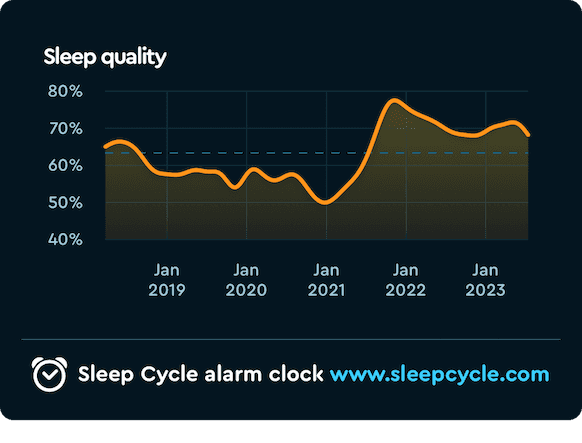
The true minimum in quality was at the beginning of 2021, when I returned home for the Covid-19 pandemic, but kept the office hours of a timezone 4 hours later than Argentina. This meant waking up extra early for many weeks, but having a hard time going to bed earlier.
Then I returned to Vienna, later quit that job, and was much clearly more relaxed. I moved back to Argentina for good and my sleep quality has not fell from 60%, but at the time of writing it’s 20 points down from my all time high. Must be my addiction to Twitter before bed.


Regularity
“Your Regularity is one of the most important factors for better sleep, but also a factor you can totally own. We all have habits that affect our well-being, and when you go to bed or rise in the morning is one of the strongest influencers. In fact, if you're sliding here, it's like being jetlagged without the travelling involved. Regularity tells you about your bedtimes and wake up times over a period of time. The higher it is, the more regular your bedtime and wakeup times, and that leads to better sleep. If you're not happy with this rating, just find your sleep beat and stick to it. Doesn't matter if you're a night owl or a lark. Results will come quickly either way.”
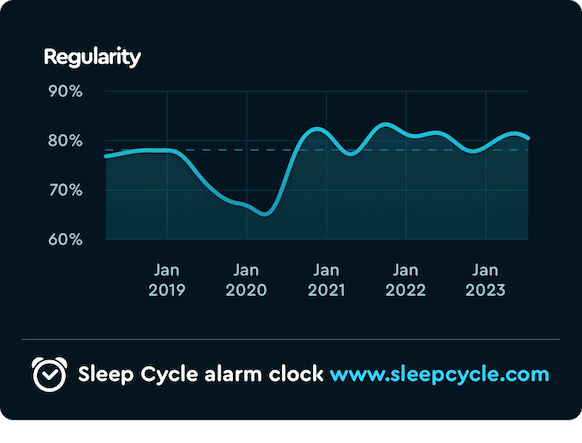
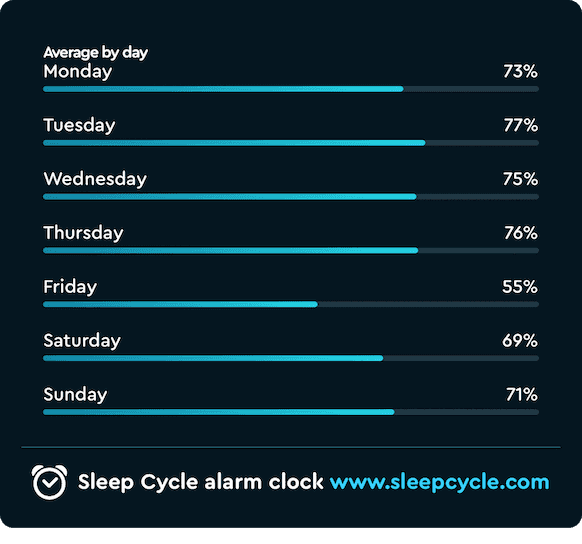
Went to Bed
“You'd be forgiven for thinking this one's pretty obvious. It measures when you go to bed. And that's it. Right? Not quite, because a key component to getting a good night's rest is to maintain your bedtime routines, and going to bed at about the same time every night, is a factor. Some argue that maintaining your bedtime routine is more important than getting enough hours of sleep, but until that's settled, we'll stick with just saying that it makes a difference. A potentially major one.”
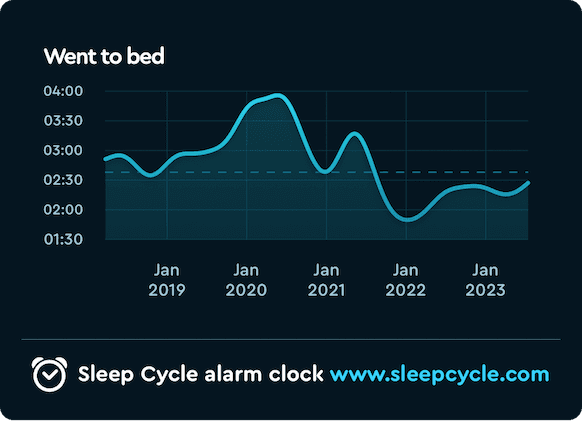
It’s still bad. Provided my job starts at 9:30 am or later, I don’t see myself improving here.
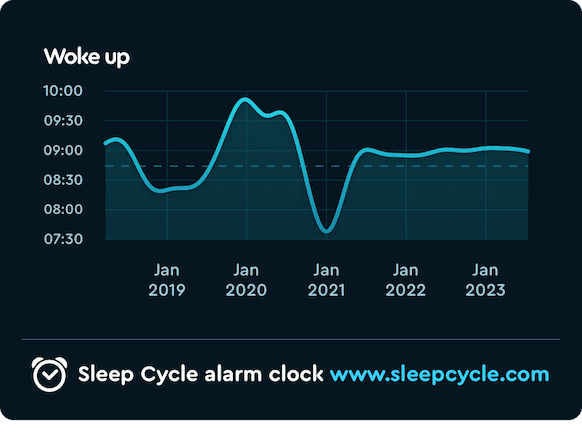
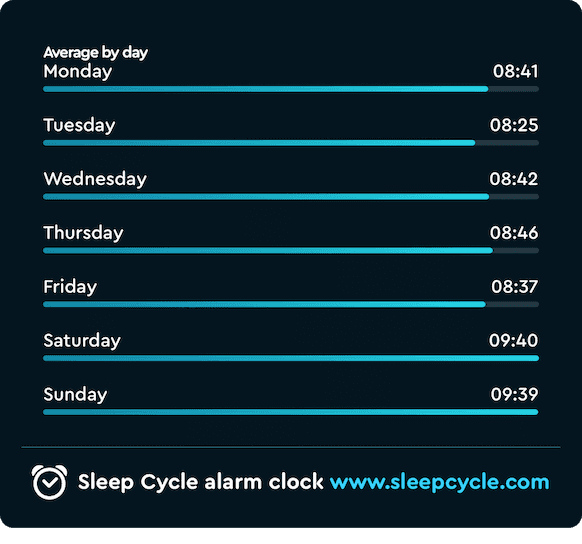
Efficiency
“Sleep efficiency is an important measure of the quality of your sleep. It represents the percentage of time spent asleep during the time you were in bed. For example, if you spent 8 hours in bed and slept for 7 hours, your sleep efficiency would be 87.5%. A high sleep efficiency score indicates that you are spending most of your time in bed asleep, which is important for feeling well-rested and alert during the day. On the other hand, a low sleep efficiency score may indicate that you are experiencing difficulties falling asleep or staying asleep throughout the night. Monitoring your sleep efficiency over time can help you identify patterns and make adjustments to your sleep habits that can improve your overall sleep quality. The Sleep Cycle app provides tools to track your sleep efficiency and offers insights and recommendations to help you optimize your sleep.”

Asleep
“Time Asleep is where the real action is. This is where Sleep Cycle says you're not just in bed, but actually sleeping as well. While time isn't the sole factor to get a good night's sleep, it's so important that ignoring it, will influence everything, such as deep sleep, movements and REM sessions. If you don't clock the hours, you have less chance to recover, even if you're an expert sleeper. If you want to tweak just one thing, start here. Putting in the time to get the sleep you deserve, will help. We promise.”
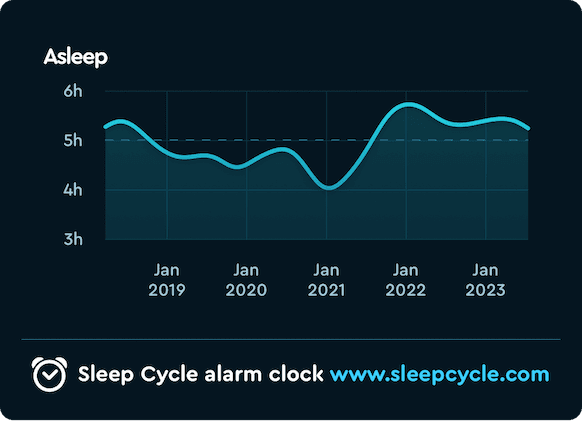
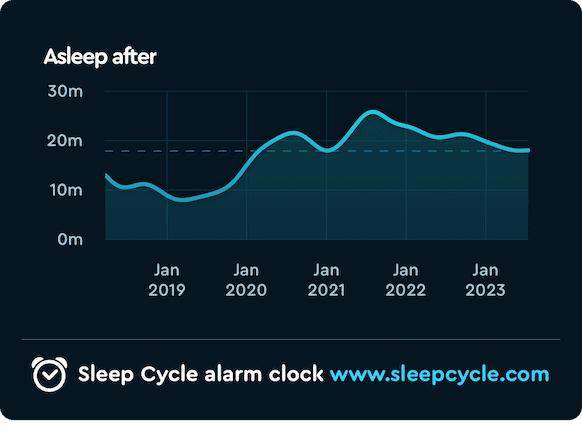
Farewell
Thank you for reaching the end! I hope this inspired you to improve your sleep, and to think how essential it is to our life, no matter your age or habits.
Let us never forget what it feels like to be truly awake during the day.
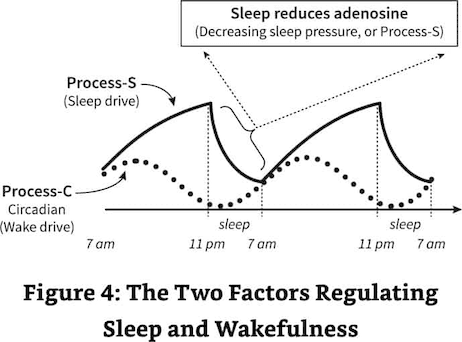
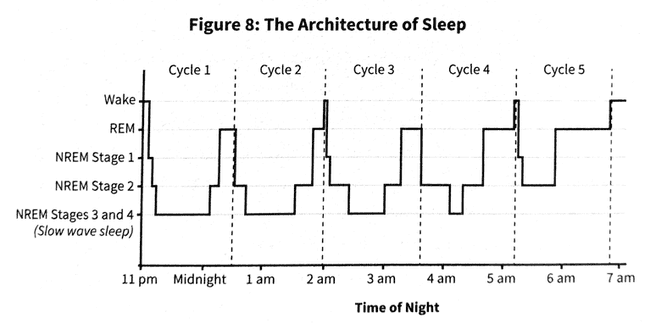
Comments
Thank you for your comment! Under review for moderation.